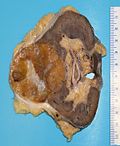Gross processing
Gross processing in the context of pathology refers to the examination and preparation of surgical specimens by a pathologist or a pathology assistant before these specimens undergo further microscopic examination. This initial step is crucial for the accurate diagnosis, treatment planning, and research in medical science. Gross processing involves the description, dissection, and selection of tissue samples for histological analysis.
Procedure
The procedure of gross processing typically involves several steps:
- Receiving and Labeling: Specimens are received in the pathology laboratory with appropriate clinical information and are labeled correctly to ensure accurate identification.
- Initial Examination: The specimen is visually inspected to assess its size, shape, color, and any other notable features. This step may also involve palpation to identify areas of interest or concern.
- Dissection: The specimen is carefully dissected to expose areas of pathology or to sample representative sections of the tissue. This step requires a thorough understanding of anatomy and pathology to ensure critical areas are not missed.
- Description: A detailed description of the specimen and any findings during the dissection is recorded. This includes measurements, the appearance of any lesions, and the relationship of lesions to surrounding structures.
- Sampling: Small sections of tissue are selected for further microscopic examination. The choice of these sections is critical and is guided by the initial examination and dissection findings.
- Fixation: The selected tissue samples are placed in a fixative solution, such as formalin, to preserve cellular details and prevent degradation.
Importance
Gross processing is a critical step in the diagnostic process. It ensures that:
- The most relevant areas of a specimen are selected for microscopic examination.
- Adequate and appropriate samples are obtained for additional tests, such as immunohistochemistry or molecular pathology.
- The pathologist has a comprehensive understanding of the specimen's pathology, which aids in accurate diagnosis.
Challenges
Gross processing requires a high level of skill and experience, as the quality of the gross examination can significantly impact the final diagnosis. Challenges include:
- Ensuring that all relevant areas of a specimen are sampled, especially in complex cases or with specimens that have multiple pathologies.
- Balancing the need for thorough sampling with the preservation of tissue for future testing or examination.
- Maintaining specimen integrity and preventing contamination during the processing.
Training
Professionals involved in gross processing, such as pathologists and pathology assistants, undergo extensive training. This training includes:
- Detailed study of human anatomy and pathology.
- Hands-on experience with specimen dissection and processing under supervision.
- Familiarity with laboratory protocols and safety procedures.
Transform your life with W8MD's budget GLP-1 injections from $125.
W8MD offers a medical weight loss program to lose weight in Philadelphia. Our physician-supervised medical weight loss provides:
- Most insurances accepted or discounted self-pay rates. We will obtain insurance prior authorizations if needed.
- Generic GLP1 weight loss injections from $125 for the starting dose.
- Also offer prescription weight loss medications including Phentermine, Qsymia, Diethylpropion, Contrave etc.
NYC weight loss doctor appointments
Start your NYC weight loss journey today at our NYC medical weight loss and Philadelphia medical weight loss clinics.
- Call 718-946-5500 to lose weight in NYC or for medical weight loss in Philadelphia 215-676-2334.
- Tags:NYC medical weight loss, Philadelphia lose weight Zepbound NYC, Budget GLP1 weight loss injections, Wegovy Philadelphia, Wegovy NYC, Philadelphia medical weight loss, Brookly weight loss and Wegovy NYC
|
WikiMD's Wellness Encyclopedia |
| Let Food Be Thy Medicine Medicine Thy Food - Hippocrates |
Medical Disclaimer: WikiMD is not a substitute for professional medical advice. The information on WikiMD is provided as an information resource only, may be incorrect, outdated or misleading, and is not to be used or relied on for any diagnostic or treatment purposes. Please consult your health care provider before making any healthcare decisions or for guidance about a specific medical condition. WikiMD expressly disclaims responsibility, and shall have no liability, for any damages, loss, injury, or liability whatsoever suffered as a result of your reliance on the information contained in this site. By visiting this site you agree to the foregoing terms and conditions, which may from time to time be changed or supplemented by WikiMD. If you do not agree to the foregoing terms and conditions, you should not enter or use this site. See full disclaimer.
Credits:Most images are courtesy of Wikimedia commons, and templates, categories Wikipedia, licensed under CC BY SA or similar.
Contributors: Prab R. Tumpati, MD



